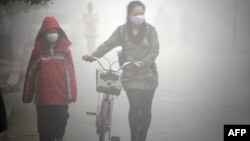BEIJING —
Chinese cities should close schools, cut working hours and stop outdoor activities during the most severe spells of air pollution, the Ministry of Environmental Protection said on Wednesday.
“Every possible compulsory measure” must be taken to cut emissions during the heaviest smog, which has a serious impact on health, the ministry said, including suspending factory production and imposing traffic restrictions.
The ministry's guidelines, issued in a circular, come as China grapples with frequent choking smog in its big cities, a consequence of years of breakneck economic growth that has fuelled public anger.
State media recently reported that an 8-year-old-girl who lived near a busy thoroughfare in the coastal province of Jiangsu had been diagnosed with lung cancer. The case of the girl, called the country's youngest lung cancer patient, has sparked a public outcry.
Despite frequent calls for cutting pollution over recent years, and growing public anger, the problem has only got worse.
Schools and workplaces typically operate as normal in all but the most severe smog, even when it reaches hazardous levels.
Primary and middle schools suspended classes last month in the northeastern city of Harbin during a smog emergency. The airport and some bus routes were also closed.
China must also toughen anti-pollution measures on industry and reduce its dependence on coal, which produces more than three quarters of electricity, the Environment Ministry said.
Public security departments should also toughen checks on vehicles, including phasing out older ones, and ensure there are not too many on the roads, it said.
China said in September it would slash coal consumption and shut down polluting mills, factories and smelters, though experts have said implementing the measures would be tough.
Air pollution is expected to worsen this winter because of a chronic natural gas shortage.
“Every possible compulsory measure” must be taken to cut emissions during the heaviest smog, which has a serious impact on health, the ministry said, including suspending factory production and imposing traffic restrictions.
The ministry's guidelines, issued in a circular, come as China grapples with frequent choking smog in its big cities, a consequence of years of breakneck economic growth that has fuelled public anger.
State media recently reported that an 8-year-old-girl who lived near a busy thoroughfare in the coastal province of Jiangsu had been diagnosed with lung cancer. The case of the girl, called the country's youngest lung cancer patient, has sparked a public outcry.
Despite frequent calls for cutting pollution over recent years, and growing public anger, the problem has only got worse.
Schools and workplaces typically operate as normal in all but the most severe smog, even when it reaches hazardous levels.
Primary and middle schools suspended classes last month in the northeastern city of Harbin during a smog emergency. The airport and some bus routes were also closed.
China must also toughen anti-pollution measures on industry and reduce its dependence on coal, which produces more than three quarters of electricity, the Environment Ministry said.
Public security departments should also toughen checks on vehicles, including phasing out older ones, and ensure there are not too many on the roads, it said.
China said in September it would slash coal consumption and shut down polluting mills, factories and smelters, though experts have said implementing the measures would be tough.
Air pollution is expected to worsen this winter because of a chronic natural gas shortage.





